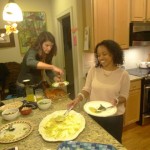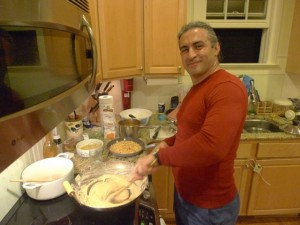Persian Food
By Cecil Poole
Eighteen of us sat down for dinner. Organised by the indefatigable Daughter in Law (The d.i.l.). There was the woman whose son Vaughan had the party at the “Transplanting Cultures” farm, where the 31 Burmese Karen families grow their vegetables, flowers and medicinal plants. The fellow who last year took me 90 minutes south of Chapel Hill (NC) to the innovative creative incubator at the old Star NC cotton mill where he practiced glass blowing. There was a professional fund raiser for the University of North Carolina, a couple of lawyers, one of whom practiced mediation in divorce settlements. Also there were the couple who organised my canoe trip in Minnesota’s Boundary Waters, and some men keeping a very close eye on their wives (not without reason). Three or four of those present had at one time or another been president of the Board of the best Child Care in Chapel Hill. All in all it was a pretty typical dinner party crowd.
The kids had been fed – all ten of them, and then put in front of a large screen to watch educational films – or at least films that would keep them quiet while the adults ate.
 As I said, eighteen of us sat down for dinner, at the d.i.l’s home. She didn’t cook the meal. No, we had chefs come in and cook for us. Three of them. Plus a co-ordinator. They brought along a number of semi prepared dishes and made a few from scratch in situ.
As I said, eighteen of us sat down for dinner, at the d.i.l’s home. She didn’t cook the meal. No, we had chefs come in and cook for us. Three of them. Plus a co-ordinator. They brought along a number of semi prepared dishes and made a few from scratch in situ.
Mint yogurt, rice with copious quantities of chopped dill and faba beans, halim bademjam – an eggplant dish, lots of lamb “calf” they called it, shank is what I’d say it was.
 Lots of cumin, cardamon, saffron, tumeric, nuts, lentils, mint again, honey, couscous and coucou sabzi – a herb frittata, and finished off with home made halva. Each dish was brought to the table by the three chefs and then one of them would describe the making of it, and its cultural significance.
Lots of cumin, cardamon, saffron, tumeric, nuts, lentils, mint again, honey, couscous and coucou sabzi – a herb frittata, and finished off with home made halva. Each dish was brought to the table by the three chefs and then one of them would describe the making of it, and its cultural significance.

Yes, this was Persian food, cooked by Iranian refugees. These chefs had been in the united States less than six months. Each had good English, each was assured in his cooking – the three chefs were male. They exuded confidence and pride. They seemed especially proud that ordinary Americans would take them and their food seriously.
I’ve returned to Australia a little perplexed. America, the United States, seems to me in so many ways a place of stratification, of delineation based on income, on ‘class’, on skin colour, ethnicity, political belief or religion, yet in so many other ways there seems to be an embracing of difference, an exploration of the new and unusual, a delight in the finding new and rich things. It seems as though multiculturalism is alive in so many communities there, yet there is concurrently a form of taboo that prevents discussion of it. Maybe it is the lack of discussion and analysis that allows this form of mulitculturalism the freedom to work so well.
Recipes
Halim Bademjami
Coucou Sabzi

Pingback: Weekly Wrap 7 October 2013 | pcbycp